Changes in the public's opinion within the last year will offer some insight into the stability of the relationship between the United States and China.
Introduction
There is perhaps no more important bilateral relationship in the world today than the one between the United States and China—the world’s two most important players in terms of economics and security. As a new US administration led by President-elect Donald Trump prepares to take office, this relationship will help to set the tone for the foreign policy of both countries over the next four years.
The incoming US administration has already signaled it intends to take a tough line when it comes to its perceptions of unfair trade practices of China, increasing stress on an already strained relationship. The Obama administration’s inability to realize the rebalance to Asia—a central foreign policy tenet of his administration—now lacks a credible economic component given that the passage of the Trans-Pacific Partnership seems doomed. This means that the focus of the rebalance is on security. This imbalanced rebalance, combined with hawkish statements from Trump advisors, adds weight to China’s suspicion that the United States is attempting to contain Chinese influence in the region and around the world.1
Benchmarking current public opinion in both countries at the outset of such an important transition in the US-China relationship is critical. Changes in public opinion—or the lack thereof—will offer one important measure by which to judge where the relationship is headed.
Role in the World
One of the longest-running questions in the Chicago Council Survey is whether Americans think that the United States should take an active part in or stay out of world affairs. For the four decades that this question has been asked, a majority of the American public has favored an active role in the world for the United States. In 2016, this question was asked for the first time in China. While the question in neither country specifically defines what an active role in world affairs entails, the Chinese public also prefers that China take an active part in world affairs. In fact, people in both countries prefer their country take an active part in strikingly similar proportions. Roughly two-thirds in both countries prefer active engagement versus roughly three in ten that prefer their country to stay out of world affairs.
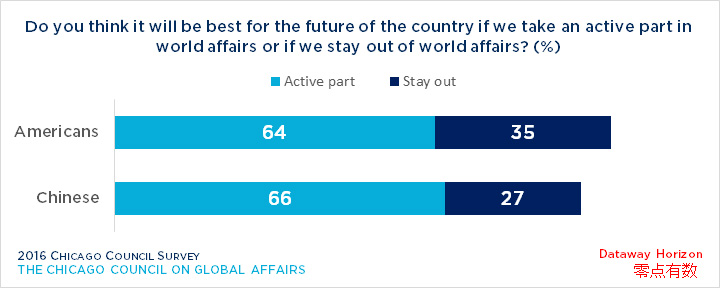
Publics in both countries also agree—although to a lesser extent—on the type of leadership they would prefer their respective countries to take. In China, a plurality (49%) want to see their country undertake a shared leadership role in the world. This preference is more intense in the United States, where 62 percent agree. It is important to note here that minorities in both countries want to see their country be the dominant world leader.
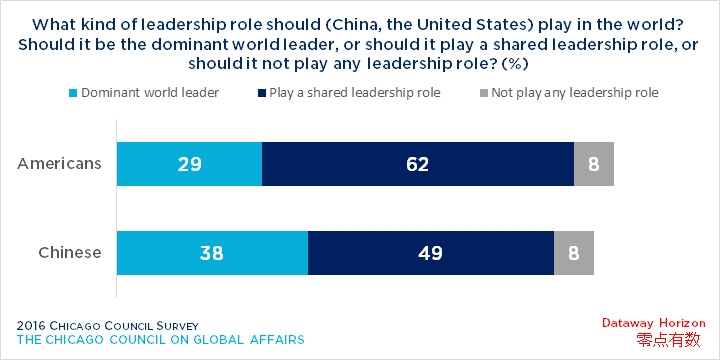
Perceptions of Bilateral Relations
Even before a new US administration enters office, publics in both countries are already pessimistic about current relations. Those negative perceptions are strongest among the Chinese public. Here, an outright majority (61%) say that relations with the United States are worsening. Fewer than four in ten (37%) think that the bilateral relationship is either improving (18%) or staying about the same (19%). This question was also asked in several countries allied with the United States and the differences in opinion between the allied publics and the Chinese public are striking: few in Australia, Canada, or South Korea say that their relations with the US are worsening, and instead, most US allies say the relationship is staying the same or improving.
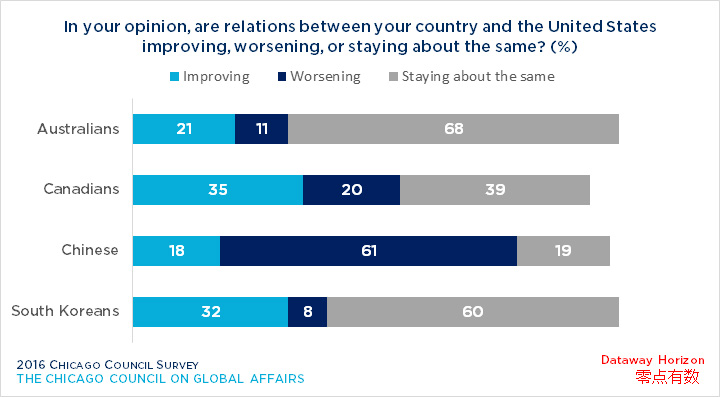
The American public is significantly less negative about current relations with China, with a minority (40%) saying that relations with China are worsening. A majority say that relations with China are either improving (11%) or staying about the same (46%). Yet Americans are significantly more negative than other publics in the region. Only 31 percent of Australians see their relations with China as worsening, and a narrow plurality of South Koreans (48%) say Sino-Korean relations are improving.
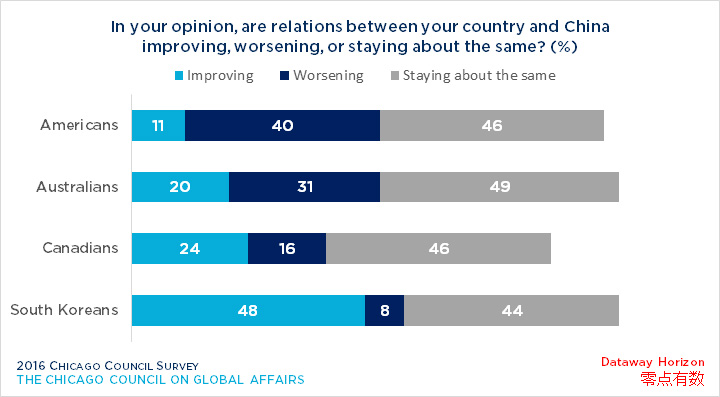
While publics in both the United States and China are pessimistic about the state of current bilateral relations, both also say the two nations should cooperate and engage with one another. Two in three Americans (63%) say that, in dealing with the rise of China’s power, the United States should undertake friendly cooperation and engagement with China, rather than actively working to limit the growth of China’s power (33%). Similarly, a majority of Chinese (58%) say that China should undertake friendly cooperation with the United States, rather than actively working to undermine US international power and influence (36%).
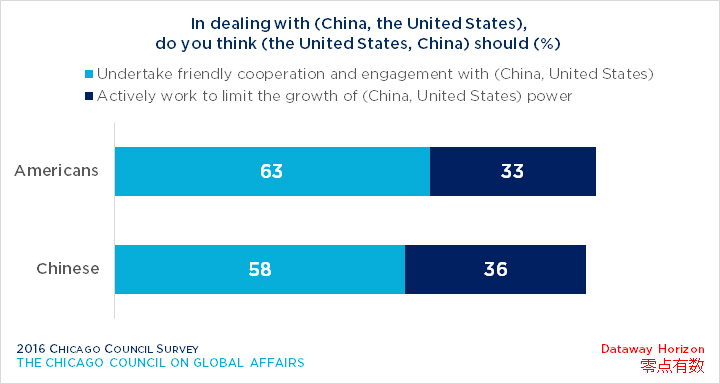
Yet Americans do not believe that China is reciprocating: two in three (66%) say that China is actively working to undermine US influence, while only one in four (27%) say it is trying to cooperate and engage with the United States.
Views of the Region
Just as views are somewhat divergent on the direction of the bilateral relationship, Chinese and American publics express very different mutual perceptions. While Chinese feel warmly towards the United States, rating the United States a 67 on a scale from 0 to 100—where 100 is very warm—Americans rate China a cooler 44.
Indeed, across a range of relationships that are key to regional and global policy, Americans and Chinese hold notably different views. In general, the Chinese public is less likely to feel favorably towards those countries most favored by Americans, and conversely, are more likely to feel favorably towards those countries least favored by Americans.
There is no better example of this disagreement than views of North Korea. Of course, the difference in North Korea policy of the two governments is well known. But those differences carry over into public opinion as well. Among Americans, North Korea is the least favored country included in the 2016 Chicago Council Survey, scoring a 19 out of 100. Among the public in China, that score is 55. This 36-point gap is the largest on attitudes towards countries, but it was not the only significant gap.
Russia is a similarly notable example. American views of Russia have declined substantially since the Russian annexation of Crimea. For the Chinese public, Russia emerges as the most popular nation of those included in the survey. Conversely, while Americans feel warm toward their longstanding ally in Tokyo (63), the Chinese public is cooler, rating Japan an average of 47.2
But there is some overlap between American and Chinese publics on the overall favorability of other countries in the region. For example, Americans and Chinese both express fairly favorable views of South Korea and India, both important actors for the future of the Asia-Pacific. And Chinese feel warmly towards Australia and Canada, albeit less so than Americans.
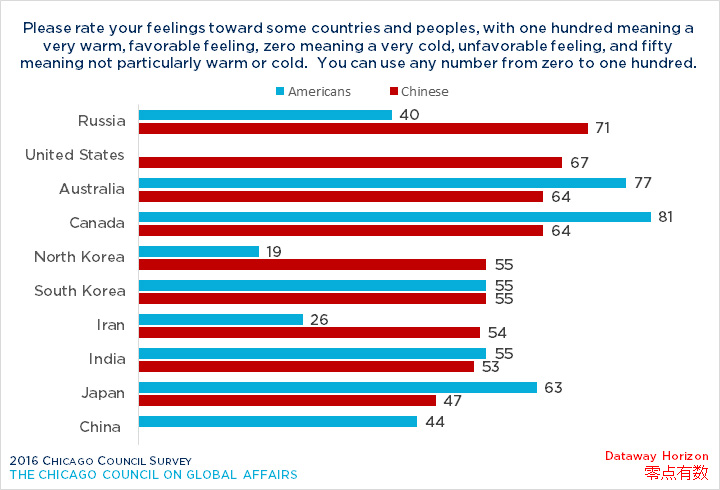
Influence and Its Determinants
One of the most consistent discussions that have accompanied the rise of China is whether or not China will erode American influence in East Asia and around the world. While trend data will ultimately be required to fully analyze how the publics perceive global influence and its change over time, the 2016 data suggests that the Chinese public thinks China is already a rival to the United States. Chinese rate both China and the United States as 7.9 on a ten-point scale in terms of perceived global influence. Americans, however, perceive a considerable gap between the two countries. While Americans rate China’s influence on average at 7.1, higher than any other country besides the United States, they give American influence an average rating of 8.5. In fact, Americans see the European Union as being nearly as influential as China on the global stage.
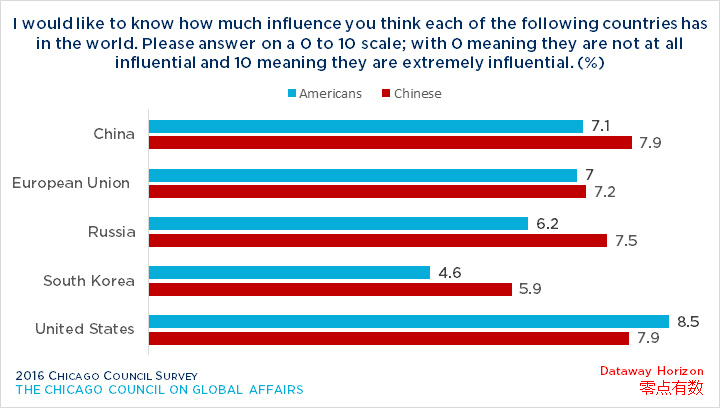
Perhaps more interesting is how each country differs on the determinants of a country’s overall power and influence in the world. In both countries, respondents were asked if military or economic strength was a more important determinant. The results are striking. Among Americans, there is a greater tendency to view economic strength as the greatest determinant of global influence (71%), while fewer cite military strength as the most important factor (28%). The Chinese public, however, is more divided on what makes a country strong: 48 percent say that economic strength is most important, while 50 percent say military strength.
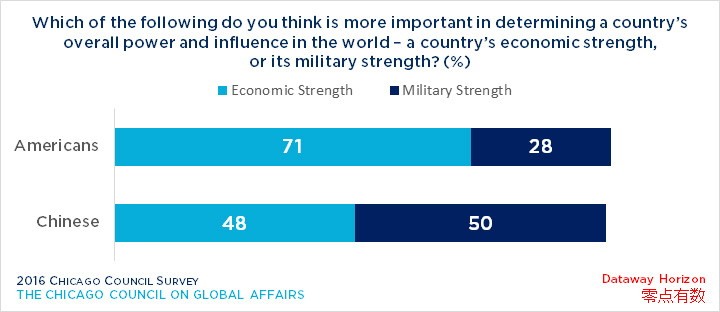
Using these potential determinants, American and Chinese respondents were asked which country they perceived to be stronger in each area. In terms of economic power, a slim majority (51%) of the Chinese public believe the United States retains the economic edge. Americans are less certain: a plurality (38%) say that China is stronger economically versus 31 percent who cite the United States. This perception likely helps to inform the ongoing policy debate about how the incoming US administration should deal with China.
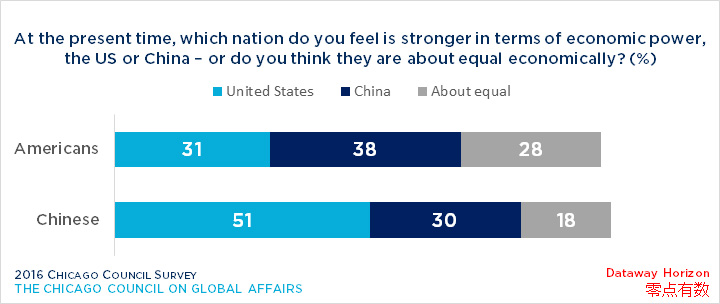
Americans are much more confident in their country’s military power vis-à-vis China. One half of Americans (50%) think the US military is stronger than China’s military, and 54 percent of China’s public agrees. Minorities in both countries cite China as the stronger military power. But just as China’s economy is growing, so too is China’s military. As China becomes a more powerful military actor on the world stage, it will become increasingly important to watch how public perceptions of military might change in response, both in the United States and in China.
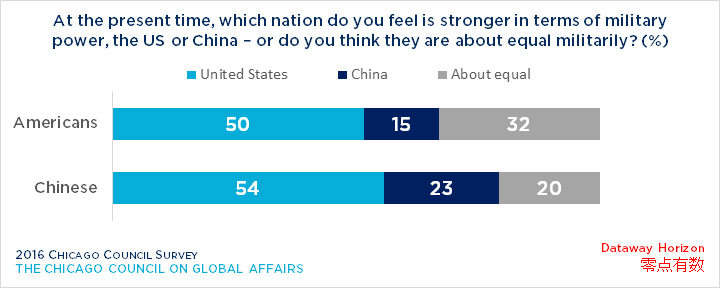
Differing Economic Outlooks
While there are clear areas of agreement between the people of the two countries, one area where the Chinese and Americans differ is in their economic outlook. By both measures included in the survey, the Chinese public is much more optimistic about both their own economic experience and the prospects for their children.
When respondents are asked to compare their economic situation with that of their parents when they were their age, Chinese are much more likely to see progress, saying that their parents had been worse off (56%). Only one in four Chinese said their parents had been better off, and even fewer (13%) said they had been about the same. Of course, given nearly two decades of double-digit growth in China’s gross domestic product this should hardly come as a surprise. But Americans are more divided: a plurality say that their parents were better off than they are today, while one in three say their parents were worse off, and one in four say they were about the same.
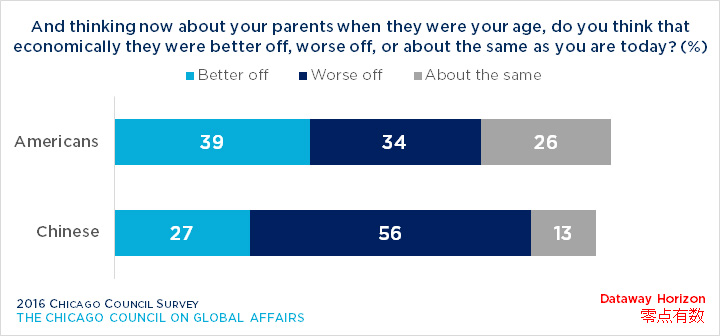
That variances in American and Chinese economic expectations are even starker when the question asks about the outlook for the next generation. In China, six in ten (63%) say that their children will be better off. Conversely, nearly the same portion of Americans (57%) say that future generations will be worse off. But unlike China, this may not reflect prevailing economic realities: Americans’ pessimism about the economic prospects of the next generation have been largely unchanged in Chicago Council Surveys since 2008.
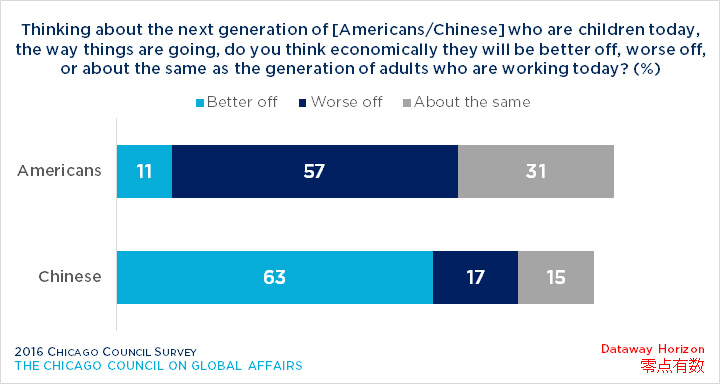
Given these contrasting economic outlooks, one of the most surprising findings is that both publics view the impacts of globalization on their nations in almost exactly the same terms. Over the past twenty years, China is often held up as the biggest winner from the rapid globalization of the world. The Chinese public largely agrees, with six in ten (61%) saying that globalization is mostly good for China. Surprisingly, Americans are also positive on globalization. Despite electing Donald Trump—who repeatedly claimed that China is “killing” the United States on trade—two-thirds (65%) of Americans say that globalization is mostly good for the United States.
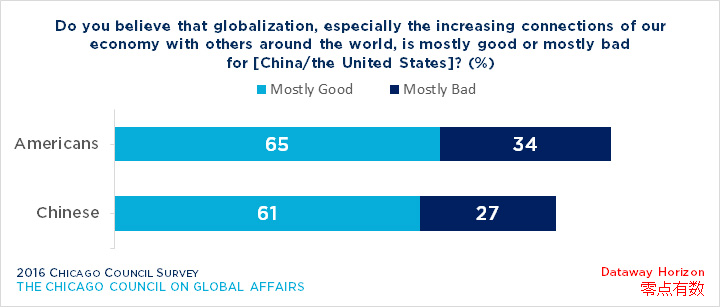
Conclusion
The results of this study show that both American and Chinese publics want to see their country pursue an active role in world affairs and think that a shared leadership role is an appropriate way forward. While both publics see the benefits to their nations from globalization, their actual economic experiences color their expectations for future growth. While Chinese see a clear upward economic trajectory from their parents’ quality of life to their own and to their children's future, Americans are more pessimistic. These personal views among Americans may lead some to view international trade as a zero-sum transaction where gains made by the Chinese come at the expense to Americans.
In the same way, the Chinese may view security issues in a similar zero sum manner, perhaps viewing American influence in the region—through alliances and its overseas presence—as an obstacle to Chinese influence in the region. Unfortunately, what has become a lopsided rebalance during the Obama administration with more focus on security more than on trade has likely contributed to this perception.
Finally, the results suggest significant distrust between American and Chinese publics, as they both tend to believe the other country is working to undermine the influence of the other. This latter measure will be an important marker to watch going forward, as growing distrust may reflect an erosion of bilateral relations—already a concern for both publics.
US Methodology
The analysis in this report is based on data from the 2016 Chicago Council Survey of the American public and US foreign policy. The 2016 Chicago Council Survey was conducted by GfK Custom Research using their large-scale, nationwide online research panel between June 10-27, 2016, among a national sample of 2,061 adults, 18 years of age or older, living in all 50 US states and the District of Columbia. The margin of sampling error for the full sample is ±2.38, including a design effect of 1.2149. The margin of error is higher for questions administered to a partial sample.
The 2016 Chicago Council Survey is made possible by the generous support of the John D. and Catherine T. MacArthur Foundation, the Korea Foundation, and the personal support of Lester Crown and the Crown family.
China Methodology
The analysis of Chinese public opinion in this report is based on data from a study conducted by Dataway Horizon as part of a multinational collaborative effort. The survey was conducted September 5-13, 2016 among a sample of 1,520 adults, 18 years or older, living in fifteen major metropolitan areas (Beijing, Tianjin, Jinan, Qingdao, Guangzhou, Shenyang, Shanghai, Nanjing, Hangzhou, Wuhan, Zhengzhou, Changsha, Chongqing, Chengdu, and Xi’an). The margin of sampling error for the full sample is ±2.5. Respondents must have resided in the local area for more than one year and not participated in any other market survey during the previous six months. Interviewees were selected through a multistep process, first using a grid map to select households, then using a standard KISH grid to select the household respondent. The survey was then administered as a face-to-face interview in the respondent’s household.
About the Chicago Council on Global Affairs
The Chicago Council on Global Affairs is an independent, nonpartisan organization that provides insight – and influences the public discourse – on critical global issues. We convene leading global voices and conduct independent research to bring clarity and offer solutions to challenges and opportunities across the globe. Ranked No. 1 Think Tank to Watch worldwide, the Council on Global Affairs is committed to engaging the public and raising global awareness of issues that transcend borders and transform how people, businesses, and governments engage the world. Learn more at thechicagocouncil.org and follow @ChicagoCouncil.
About Dataway Horizon
Dataway Horizon is an international organization based in China providing data intelligence service. It has carried out multiple practices in providing various services to the governments, large enterprises, start-ups, and non-governmental organizations both domestically and internationally. Also, Dataway Horizon fastens attention on innovative services and products under the Internet economy, and exhausts capabilities in data mining and analyzing merged data streams to support the clients’ strategies with respect to economic, social, cultural development and policy-making.
- 1Alexander Grey, Peter Navarro. "Donald Trump’s Peace Through Strength Vision for the Asia-Pacific." Foreign Policy. November 7, 2016.
- 2This may represent a rebound in Chinese opinion of Japan: results from the Spring 2014 Pew Global Attitudes survey found far less favorable views (8% favorable, 86% unfavorable).




